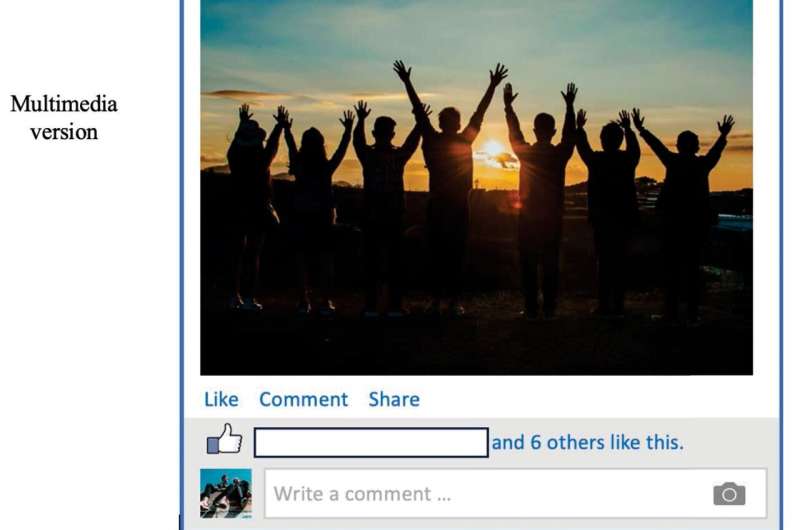This article has been reviewed according to Science X's editorial process and policies. Editors have highlighted the following attributes while ensuring the content's credibility:
fact-checked
peer-reviewed publication
trusted source
proofread
Social media posts may be viewed differently by others compared to how users perceive themselves

In a new study, viewers of Facebook users' posts came away with perceptions of the users that differed from the users' own self-perceptions. Qi Wang and colleagues at Cornell University, New York, US, present these findings in the open-access journal PLOS ONE on December 20, 2023.
Many people post on social media platforms in order to express themselves and connect with others. Prior research has shown that viewers of personal websites, such as blogs or online profiles, form largely accurate perceptions of the authors' personalities. However, social media posts, such as Facebook status updates, are often isolated and lack context. Few studies have explored how users' self-perceptions align with how others perceive them after viewing such posts.
To shed new light, Wang and colleagues asked 158 undergraduate students to answer questions about their own personal characteristics, including their extraversion, disclosiveness, connectedness, self-esteem, independence, and interdependence. The students also shared their last 20 Facebook status updates.
Then, two groups of additional participants viewed the Facebook updates and answered questions about the users' characteristics. One group viewed the updates in a multimedia format with text and any accompanying images or hyperlinks, and the other saw text-only versions.
Overall, the viewers' perceptions of the Facebook users differed from users' self-perceptions. For instance, viewers tended to see users as being more disclosive, having lower self-esteem, and being less interdependent than how users perceived themselves. However, viewers' perceptions and self-perceptions of connectedness aligned, perhaps reflecting that a primary aim of social media posts is to connect with others.
Compared to text-only viewers' perceptions, multimedia viewers' perceptions were more in line with users' self-perceptions. However, there was more variation among multimedia perceptions, while text-only viewers showed more consensus. In addition, both groups' perceptions varied with users' gender and ethnicity, in line with judgments observed in offline contexts in prior research.
These findings provide new insights into the dynamics of online self-presentation and impression formation. The authors note that such understanding is important for fostering good communication and relationships. Future work could deepen understanding by, for instance, including a longer timeline of updates or considering other platforms such as TikTok.
The authors add, "Can people form accurate impressions about us from our social media posts? Our study finds that there are substantial discrepancies between how people view Facebook users based on their status updates and how the users view themselves. Multimedia channels make the impressions more accurate, and user characteristics related to relationship-building, gender and ethnicity are more accurately perceived."
More information: The self online: When meaning-making is outsourced to the cyber audience, PLoS ONE (2023). DOI: 10.1371/journal.pone.0294990. journals.plos.org/plosone/arti … journal.pone.0294990
Journal information: PLoS ONE
Provided by Public Library of Science




















